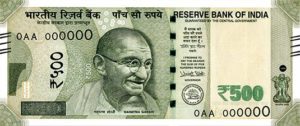On November 8, 2016, at 8 PM, Prime Minister Narendra Modi addressed the nation saying that at 12 AM, next day, all ₹500 and ₹1000 notes would no longer be recognized as a legal tender. According to Mr. Modi, demonetization would weed out black money and put a huge dent into terrorist financing. If the measure achieves the desired purpose, and I have my doubts, then, it would indeed be a shot across the bow to the hoarders of black money, the terrorists, their sponsors and their sympathizers.
Thus, through an “executive order” and with a stroke of a pen, the value of all ₹500 and ₹1000 notes were marked to zero, thereby proving that all fiat currencies eventually return to their intrinsic value—zero. Fiat currencies have a long history of failure. That’s not a surprise at all, as all fiat currencies enjoy the status of a legal tender only by a decree of the government, and nothing else. It is just a piece of paper issued by the RBI, promising to pay the bearer a sum of “insert amount here“. That piece of paper is your medium of exchange, which you can use for various business transactions or deposit in a bank to be “converted” into digital currency.
“It is well enough that people of the nation do not understand our banking and monetary system, for if they did, I believe there would be a revolution before tomorrow morning.”—Attributed to Henry Ford by Charles Binderup
It is just trust that holds the current monetary system together. When somebody breaks that trust, currency notes are not even worth the paper it is printed on. In one fell swoop, this demonetization move by the government has destroyed the trust people have in paper currency. What’s stopping the government from making something else illegal to hold, tomorrow? Maybe gold and silver will be the next target. This only substantiates the belief that whatever the government giveth, government can taketh away, too! That’s true not only for fiat currencies, but also your privileges, your rights and your freedom. If you really look at the entrails of the government and how it operates, you’ll realize that we commoners are just cogs in the wheel. Hamsters, that’s what we all are. Take a peek at history and you will find your answers.
Now, some of you will say that the value of the notes were not marked to zero, people could and did exchange, and are still exchanging it for new notes in the bank. Well, when a currency note is no longer recognized as a legal tender, it just becomes a piece of paper, which is valueless. Burn it, shred it or make a confetti out of it, it doesn’t matter; it’s value is zero, zilch, nada. It is a different matter altogether that the magnanimity of the government afforded us with the luxury of exchanging the old notes with the new. They could have very easily issued an executive order stating that the exchange would not be possible; hence, you might as well burn your old notes. Yes, the notes being declared non-exchangeable would have started a revolution in this country, but that’s a matter for discussion for another day.
Following the announcement by Mr. Modi, many pundits, sycophants, official spokesperson, and many members of the Indian Lügenpresse went into an overdrive showering accolades on the government for their, what many called, a “surgical strike on black money.” Some even called it a “massive googly bowled by the PM.” Let’s for a moment give the government the benefit of the doubt and say that it indeed wants to do the right thing and has the good of the people at heart. However, it is my opinion that this “initiative” will end up being a big nothing-burger; only time will tell. It is my opinion that corruption will remain the same or may even increase because all those who are corrupt have lost money trying to make black money white. So, they will only try to recoup their losses. Regarding terrorist financing, there is always the Hawala route.
Do note, I would be remiss not to mention that I unequivocally support any effort to weed out black money from the system and clean the system of graft and money launderers. However, the current measure undertaken may not be the right route to pursue. The government is only targeting the symptoms and not the cause. Until they attack the cause of corruption, all measures undertaken will fail over time, because many Indians have mastered the art of gaming the system. I have my doubts about what this drive will achieve; however, if this move can change the fabric of the nation, then, many of us, myself included, will have to eat crow. Only time will tell, whether I am right or wrong.
Now, as a commoner, I had to jump through many hoops to exchange my notes, withdraw some notes from my bank account and deposit some notes to my account. My mom, a senior citizen, also had to jump in the fray and stand in labyrinthine queues at the bank, to withdraw money for our family. It was extremely difficult to meander our way through the systems and the processes put in place, overnight, to get what is rightfully ours. Therefore, based on my experiences from the last few days, I have learned a few valuable lessons, made a few observations and reached a few conclusions, which I am listing in this blog post.
1. He who panics first, panics best
Initially, very few people realized the implication of this decision by the Modi government. After Mr. Modi addressed the nation, it took time for the message to be registered with the masses. At our house, though, we instantly realized the enormity of this decree and the immediate steps that needed to be undertaken. Hence, we stepped out at 10 PM to “raid” some ATMs and withdraw some low denomination notes.
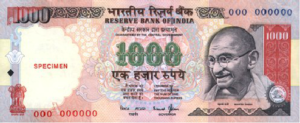
Indian ₹1000 currency note. By Note specimens from Reserve Bank of India used to create this image.
In retrospect, I can safely say that a few of us, in our city, panicked first and we panicked best. The lines at the ATMs were relatively small, initially. My cousin and I were able to withdraw a few thousand rupees in 100 rupee notes, quite easily. By 11 PM, though, a majority of the people in the city realized what’s at stake and all hell broke loose, and madness set in at the ATMs. Most of the ATMs ran out of 100 rupee notes very quickly, and that’s when the real panic set in.
In large cities and metros with multiple malls, grocery stores and shopping centers, it wouldn’t have been a problem for shoppers if they were not carrying any cash, as plastic would have worked. Hence, most people in large cities weren’t quite affected by this “executive order”. It is the people in smaller cities who bore the brunt of this sudden decision by the government. For them, not having cash in pocket meant no food at the table. It is the life of these average Indians, the lives of daily wage earners, the weekly wage earners, the poor, the needy and the forgotten that was scythed by the government’s decision. I don’t think the decision makers had any empathy for the millions of people who struggle daily. They ran them over, without even a second thought.
2. A poor man always pays for a rich man’s crime
Who do you think are the most corrupt in India? Is it the common men, or the elites? Is it not a fact that politicians, bureaucrats, power-brokers, government servants and the chosen elites are the most corrupt in this country? How many politicians, bureaucrats, power-brokers and government servants took office with a few thousand or a few lakh of rupees in their bank account, and how many of them left office as a multi-millionaire? Is it not an open secret that the armed forces are rife with corruption? How may senior army officers have accrued wealth disproportionate to their income? Have they been asked to declare their wealth by the IT department? How many senior IT department staffs have amassed wealth that wouldn’t be possible with the salary they earn. Why isn’t the government targeting these people first?
I know many people from the SC/ST community who do not have to pay any taxes, as long as they are not posted outside of their home state. Those same people work for the state/central government and have amassed wealth disproportionate to their income. Many of them have hundreds, if not thousands, of crore of ill-gotten wealth. They have properties and investments throughout India and the world. Why isn’t the government going after them first?
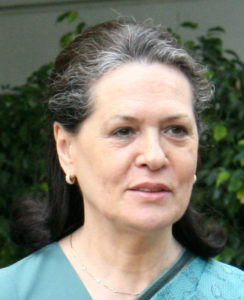
Sonia Gandhi. By U.S. Department of State [Public domain], via Wikimedia Commons
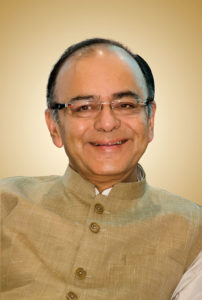
Arun Jaitley. Augustus Binu [CC BY-SA 4.0], via Wikimedia Commons
The people who are actually being inconvenienced by this measure are the honest hardworking people of the country. Their money is now locked up in a bank and released drip-by-drip. Do you really think that holders of black money are losing their sleep over this measure. They have an army of accountants and lawyers and must have already devised ingenious schemes to beat the system.
Furthermore, some of them have their finger on the pulse of the government and have inside information on the happenings in the corridors of power. Do you think the power-hungry politicians really care about anything else other than getting re-elected? Do you really think they are out there thinking about your well being? How many of those politicians and elites, do you think, had to wait for hours in the sun to withdraw their money? I am sure they had their factotums do it for them. One call from them to the manager of a bank would result in all their work getting done. These politicians are supposed to work for us; we elected them after all. When did they turn the tables on us?
Did you know that, as per the Income Tax department, only 6% of the ill-gotten wealth is stored in the form of liquid cash. Rest of it is stored in precious metals, real estate, stock market, foreign currencies, foreign bank accounts in offshore tax havens, etc. As regular Indians struggle to maintain liquidity, people with ill gotten wealth are finding various creative ways to convert their black money into white.
Therefore, it seems the government is punishing everybody to hold a corrupt few accountable. Why harass the innocent to punish the guilty? The only conclusion I could reach is, because the poor people always pay for the crimes that the rich men commit and, you know what, they get away with, too.
3. Cashless society
“If you want a picture of the future, imagine a boot stamping on a human face—forever.” 1984, George Orwell
There have been comments made in various quarters about how this demonetization exercise is a great step towards a cashless society. To my utter surprise nobody raised an eyebrow or even batted an eyelid. It seems nobody even cares to understand what a cashless society portends.
A cashless society will be great for the government but absolutely horrible for the freedom of its citizen. If implemented, we will indeed be living in an Orwellian state, where the government would know everything about your financial habits–what you eat, what you buy, how much you owe, how much you own. Wouldn’t it be great for the big brother government to have such level of control over the populace? Look at what it can do—implement NIRP, use your digital money to bail-in banks, seize your assets if they think you are a threat, block your access to your digital money if you become belligerent. A wonderful free society totally subservient to a big brother. Isn’t that a great future to look forward to or what?
Now, to have absolute control over its citizen, a cashless society is not enough. They will have to make sure that people cannot store their wealth outside of the banking system. Therefore, here is a prediction of mine, the next shoe to drop will be the government seizing safety deposit boxes in the banks to find out how much wealth is stored in those boxes. Once done, gold and silver will be banned, seized or confiscated.
The final nail in the coffin will be the decree that aadhar card will be mandatory for all; it has anyway been made mandatory, surreptitiously, for availing government freebies. Biometric tracking of citizens worldwide is the only way to subjugate the free human spirit. Only when all this is done, will the plebes be under absolute control of the government. Now, any policy can be implemented, any decree can be issued and any agenda can be pursued, without the fear of rebellion from the people.
4. Has RBI been co-opted? Is this one of the reasons why Raghuram Rajan was shown the door?
A similar exercise was undertaken by RBI, in 2014, to facilitate the exchange of all pre-2005 notes with new notes. However, while announcing the program, RBI did not declare the existing pre-2005 notes illegal. Initially, the deadline for exchanging the notes was set for June 30, 2015. Next, it was extended till December 31, 2015. Finally, it was extended till June 30, 2016. This exercise was undertaken during the tenure of Raghuram Rajan, the then governor of RBI. Rajan’s tenure ended on September 4, 2016, and he was replaced by Urjit Patel. Two months and four days later, the government, certainly with RBI’s blessings, demonetized all ₹500 and ₹1000 notes. Rajan’s view on demonetization is well-known. Embedded below is a video of him addressing a question on demonetizing currency notes.
Here is an excerpt of Rajan responding to a question on black money and demonetization.
“I am not quite sure if what you meant is demonetise the old notes and introduce new notes instead. In the past demonetisation has been thought off as a way of getting black money out of circulation. Because people then have to come and say “how do I have this ten crores in cash sitting in my safe” and they have to explain where they got the money from. It is often cited as a solution. Unfortunately, my sense is the clever find ways around it.
They find ways to divide up their hoard into many smaller pieces. You do find that people who haven’t thought of a way to convert black to white, throw it into the Hundi in some temples. I think there are ways around demonetization. It is not that easy to flush out the black money. Of course, a fair amount may be in the form of gold, therefore even harder to catch. I would focus more on the incentives to generate and retain black money. A lot of the incentives are on taxes.“—Raghuram Rajan
As you can see, he wasn’t a supporter of demonetization and knew that most of the black money are held in the form of gold and it wouldn’t be easy to flush black money out of the system. He was more interested in using taxes as incentives. Here is what I think transpired, conjecture on my part, of course, when it came to deciding extending the tenure of Rajan as the governor of RBI for a second term.
The government was interested in RBI lowering the interest rate; it was also interested in pursuing demonetization as a strategy for flushing out black money. Rajan objected to both recommendations; hence, various party apparatchiks were set after him. Since, Rajan knew that his wings would be clipped and he will not be allowed to pursue his agenda, he decided not to seek a second term.
Rajan was replaced by an “insider”, Urjit Patel, who was initially sold as an inflation hawk. However, Urjit turned out to be a dove and did not disappoint the market and his handlers by reducing the interest rate at the first opportunity available. Furthermore, he must be a supporter of demonetization, because there hasn’t been a word against it from the RBI; hence, the government had a willing partner in RBI in this demonetization exercise. I, therefore, feel that the government has secretly taken over the RBI. RBI is no longer independent and going forward expect it to toe the government line.
5. The fourth estate has been captured.
The fourth estate is now just another arm of the government. A majority of the news channels and newspapers are now beholden to the government. The role of the press is to be the government’s watchdog and have a check-and-balance function. However, most of them have just become the propaganda arm of the government and very few of them are providing any alternative view points. Mostly, they are all parroting the government’s narrative. The newest phrase in town is “surgical strike”. Nowadays, everything is a surgical strike. Some of them are even claiming that demonetization will surely flush out all black money, and we will start off with a blank slate. The temporary pain is worth the final gain. We’ll see how true that statement is, in due time.
6. The underground economy
Even though the government has banned ₹500 and ₹1000 notes, which has resulted in decreased liquidity for all, a huge underground economy has cropped up. Currently, many businesses are not accepting the ₹2000 note because they have no change to return for the high-value note. Therefore, all local business are still accepting the revoked ₹500 and ₹1000 notes to keep their operations running. Many, if not all, roadside vendors, tea shop owners, vegetable vendors, taxi drivers, auto drivers, etc. are all accepting the old notes. Furthermore, many people are bartering or using goodwill to buy in-kind and pay later.
In addition, a currency mafia has started operating in many cities. They will take the old note and charge a fee, anything between 10%, 15% or 20% of the amount, to turn your black money white. It seems many bank employees are in connivance with the currency mafia. Good luck weeding out black money when bankers are acting as a conduit for converting black money into white. Fox guarding the hen-house, I would say.
7. Bank employees need to be better trained
It has always been my observation, from personal experience, of course, that many public sector workers, including bankers, are very poorly trained in the art of customer service. However, with the recent demonetization episode, I’ll have to revisit that observation and update it to include private sector bankers, too. I was extremely disappointed and troubled by their horrible treatment of their customers. Some of them, and I hate to say it, were they running around like a headless chicken in the mêlée that resulted from ₹500 and ₹1000 notes being declared illegal by the government. And most of them were venting their frustration on their customers.
I have a savings account with a private bank. Last week, over the weekend, I decided to visit the bank to exchange some notes and withdraw some notes from my savings account. The bank opened at 9:30 AM. As expected, very quickly, a long queue formed in front of one of the counters designated for cash withdrawal; another line formed in front of the counter for deposit. Now, I have never worked in the banking sector. However, if I were the bank manager of that branch, or for that matter any other public sector or private sector bank, the first thing I would have done is make an announcement, to calm everybody’s nerve, stating what to expect in the next few hours. I would have asked them to be patient while everything in the bank gets up to speed and is up an running. Instead, this is what happened:
- For the next 2.5 hours, every employee of the bank was doing something or the other but, it seems, no work was getting done. They all looked frazzled. The line did not move an inch forward, but many people were walking out the bank with wads, bag full and trunk full of cash. So, I stepped up to the manager and asked what was going on. He replied his branch receives the cash, and it is from here that the money is then distributed to all the arterial branches. I then asked him if it would make sense to inform the customers about what was going on and when can the customers expect to be served. He looked at me as if I was speaking Latin. Who hires these kind of people with zero managerial skill to run a bank? I am certain that they must have an MBA or other accreditation to get the job. Don’t they teach all this in business school? Even if it is not taught, isn’t his customer service 101 and shouldn’t the bank train them before they are promoted to run a branch? Or is it all about the size of book that the branch has and everything else is secondary?
- The bank manager was screaming at his employees in front of all his customers. Great managerial skill, right there, kiddo! Yes, make your employees feel like crap in public. Some of the employees were also screaming back at him. Great teamwork, right there, folks!
- The manager told one of his employees that they were giving the wrong form to the customers. The employee’s response, “it does not matter, nobody even checks the form. “
- The manager was calling his biggest clients and telling them when to come to the bank to get their notes exchanged.
- People with connection at the bank were jumping the queue and getting their currency notes converted in no time. I was the only person to protest. Everybody else kept quiet. It seemed most of them were resigned to their fate of being led to the slaughter-house.
- Finally, at around 12 PM, the teller started attending to the customers in the line. The bank did not even have a separate queue for the senior citizens. So, a person in their mid 60s or early 70s was jostling for space with a 20-year-old kid.
- The bank never communicated to its customers that they could exchange ₹4000 of their old notes only once. Hence, many people who waited in the line for 3 hours had to return home empty-handed after the teller denied their request for exchange. How difficult would it have been for the bank to announce such facts to their customer?
- It seems that particular branch had, matter of fact, almost all public and private sector banks had, no formal process to handle this situation. Every bank employee was shooting from the hip. None of them had a handle of the situation or were prepared to improvise. They were all acting like a deer caught in the headlights–frozen in place, unable to think or move. While standing in the queue, I was thinking to myself, maybe, there is business opportunity here. I could teach them a thing or two about process management, people management, crisis management, customer service management, etc. and charge for it. However, most of them seemed like young “dogs” that had aged prematurely and weren’t ready or willing to learn new tricks.
Furthermore, based on what I have observed in other public/private banks and many anecdotes I have heard from my friends and acquaintances, it seems chaos reigned supreme in almost every branch of various banks.
8. Loss of productivity
Is it just me or does anybody else think too that this has been a huge loss of productivity for the country, but maybe nobody is counting. People had to leave work and wait in the lines for hours to get a few thousand rupees. One of my friends had to spent 6 to 7 hours visiting various ATMS to withdraw ₹4000 that was rightfully his. Now, imagine millions and millions of people spending countless hours at the bank or the ATM to exchange notes or to withdraw cash. And this has been going on for more than a week.
I wonder how much GDP gain we should expect from this loss of productivity. We should be doing this every year and very soon we all will be as productive as the developed nations. Yes, we were all told to sacrifice a bit for the good of the nation. What better way to make people follow something other than by stirring up passion for nationalism. Many other leaders, worldwide, have, and had, used this strategy to great ends. Haven’t they?
9. A flawed strategy
Would you agree that black money is one of the symptoms of corruption, not the cause of it? Then, why is the government targeting the symptoms not the cause; why indulge in a palliative effort instead of curative one? Will targeting the symptoms fix the issue of corruption, terrorist financing, etc., or will it lead to a temporary succor? In Transparency International’s Corruption Perception Index, India ranks 76 out of 168 countries. India’s corruption perception score, 38/100, shows no improvement than 2015. Why has the score remained static? Didn’t this government sweep to power on the platform of ‘acche din‘ (the better days), or was it just a ploy to get in power?
It is generally agreed upon that corruption stems from:
- Poverty;
- Low wages;
- High taxes, cess, surcharges, etc.
- Nepotism, favoritism, cronyism in every facet of our lives;
- Merit not given primacy in education, job, promotion, etc.; management quota in education; score below par and get admitted to institutions of higher learning through reservation or management fee; even IIT lowered its cut-off marks to admit more students. A few students can score as low 38% to get into IIT. Can you believe that?
- Greed;
- A culture that accepts and turns a blind eye to corruption; tacit approval/compliance to corruption;
- Bureaucratic red-tapism;
- Backlog of cases in the justice system;
- Fewer/no job opportunities;
- Lack of transparency/accountability;
- Power concentrated in the hands of a few people—politicians, bureaucrats, power brokers and elites;
- Various branches of government being dysfunctional
- and many more…
Instead of pursuing demonetization, why can’t the government tackle the aforementioned issues first? Addressing those issues should put a huge dent in corruption and its by-product, black money. No?
10. You don’t own anything, you just rent it from the government
“The more corrupt the state, the more numerous the laws.“—Tacitus
“My trust in government is absolute; I distrust it absolutely.“ I read this quote somewhere and couldn’t agree more with that quote. To most governments of the world, its most productive citizens are just tax donkeys. Everything you have or own can be taken away and confiscated in a moment’s notice should you ever get on the wrong side of the government.
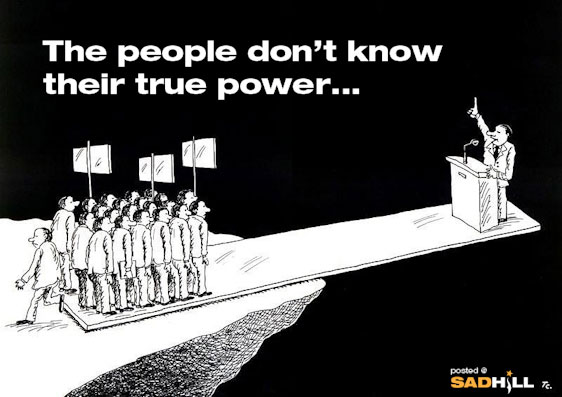
If we only knew our true power… Image source
Firstly of all, if you are political dissident, then, the government can seize your passport, and, in the name of national security, put you under house arrest. Also, if the power that be wants, you can be framed for a crime you did not commit and have all your assets seized or frozen. If you start a movement against an established order and the government will slap a case of sedition against you.
Furthermore, if you exercise free speech, which the government deems inappropriate, then, you can get arrested for fomenting trouble. If you criticize a politician on social media, chances are you’ll get arrested for posting offensive views. In addition, try being a conscientious objector and get ready for arms of the government machinery to usurp your life. Finally, become a Snowden, a Assange or a Manning, and you will be labelled a traitor, forced into exile or incarcerated.
In the US, you have civil forfeiture, where law enforcement officials can seize assets based on a suspicion of crime. Nothing has to proven, just suspicion is enough; they don’t even have to charge you to seize all your assets from you. Furthermore, in many countries, your assets can be confiscated based on civil offenses. Did you know that, on April 5, 1933, the President of the US, Franklin D. Roosevelt, criminalized possession of gold using Executive Order 6102. The reason—hoarding of gold was stalling economic growth and making the depression worse.
Finally, as I have cautioned, if this demonetization effort to flush out black money fails, then the next step the government will probably take is make holding of precious metals illegal. It is most noteworthy that most people do not hold black money in the form of liquid cash, but they convert it into precious metals, properties, etc. Therefore, how difficult would it be to pass an executive order stating that rising current account deficit, slowing or stalling economic growth, and a huge amount of black money being stored as gold are forcing the government to confiscate private gold. Do not for a second think that something like that is not possible. After all, nobody thought that the Titanic could sink; nobody thought James ‘Buster’ Douglas could beat Mike Tyson; nobody thought Donald Trump could beat Hillary Clinton, and look what happened.
Disclaimer: We at Omygdala dislike all politicians and political parties equally. It doesn’t matter if it is Congress or BJP or AAP or JDU or JD or CPI or TMC or any other local or national political party. They are mostly corrupt, they are mostly the same… two sides of the same coin. “Polytick-cians” are in it only for themselves and nobody else. The political world is filled with notorious reprobates. Hence, I am not trying to make a statement on behalf of a particular political party. My allegiance is only to the Constitution of India, and not to any political party. This opinion is mine and mine only.
We at Omygdala are also not big fans of central bankers and the God-like status they enjoy. Their policies often distort the market and lead to boom and bust cycles. They remain unaffected in their ivory towers, but the common men are destroyed by their actions. Hence, we have no love lost for them, too!
I am writing this blog post because whatever happens in the highest echelons of power affect the common folks the most. The elites rarely get hurt, only the plebes get slaughtered.

